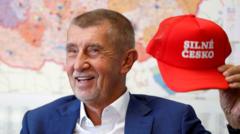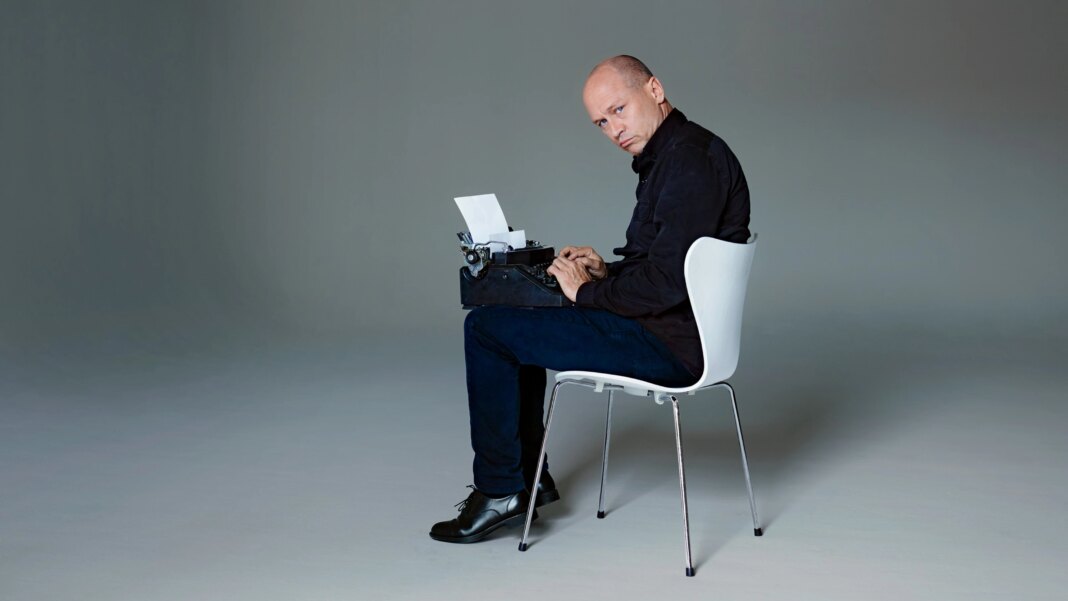Rob CameronPrague Correspondent, Prague
Reuters
Andrej Babis has taken inspiration from the US Maga movement, not least his party’s red caps saying “Strong Czechia”
Czechs go to the polls on Friday and Saturday facing a deteriorating security situation in Europe and fears of Russian interference.
Populist billionaire Andrej Babis, 71, is tipped to head the next government, replacing the strongly pro-Western, pro-Ukraine coalition.
But he’ll likely need allies on the extremes of Czech politics – and their price will not be cheap.
“We’ll never drag the Czech Republic to the East. I can absolutely rule that out,” Babis told a crowd of mostly elderly supporters, gathered around a stage in the former steel town of Kladno, just outside Prague.
“We weren’t the ones who sat down with Putin – we were the ones who expelled Russian diplomats!” he went on, referring to measures taken in his first term following revelations that Russia’s GRU military intelligence had blown up a Czech ammunition dump in 2014.
At a rally outside Prague Babis assured his supporters he would not align with Russia
A row of grey heads nodded as the former prime minister warmed to his theme.
“And never – I repeat, never – will we consider leaving the European Union. Look at what happened to Great Britain! And they’re a nuclear power. They’ve got gas, oil, a fishing industry. They’re friends with Trump,” he added.
Andrej Babis himself is also friends with US President Donald Trump.
Many supporters were wearing Babis’s red baseball cap emblazoned with the words “Strong Czechia” – heavily inspired by Trump’s Maga movement.
The problem for Babis – and it could soon become a problem for Nato and the EU – is that his ANO party is unlikely to win an overall majority.
Instead, he will likely need to form alliances with smaller parties on the fringes of Czech politics.
Opinion polls and public statements suggest his choice of potential allies will be limited to the ultra-nationalist SPD, the anti-Green-Deal Motorists, and Enough! – who are an ad-hoc coalition of rebranded Communists, the remnants of the once-mighty Social Democrats, and a blogger in a black hat who calls himself “Pitchfork” (the Czech word for redneck).
On Wednesday night, during his only head-to-head debate with Prime Minister Petr Fiala, Andrej Babis ruled out forming a coalition with the Communists. “I’ll sign a piece of paper to that effect right here in the studio,” he said.
Several of his potential allies want referendums on leaving the EU and Nato.
ANO says that is not going to happen.
“We criticise the European Union, but we don’t want to destroy it, we want to reform it,” deputy leader Karel Havlicek told the BBC.
“And Nato, well, we can criticise many things about it, but joining Nato was the most important milestone in the history of the Czech Republic, and our position is to strengthen it,” he went on.
Political science student Ondrej Kapralek fears his country may be following Slovakia and Hungary to the far right
As we spoke a large inflatable dinosaur loomed over our heads, part of a bouncy castle erected for the ANO rally. For older supporters there were tents offering cups of coffee, free blood pressure checks and the red baseball caps.
By the time I left they were gone.
Across town, 19-year-old political science student Ondrej Kapralek, who is an activist for the liberal Pirate Party, is preparing to vote in his first election.
The Pirates were part of the centre-right government until they left the coalition over a bungled digitalisation scheme.
But their political star is rising again, and could attract voters disillusioned with both the government and the populist or extremist opposition.
MICHAL CIZEK/AFP
Prime Minister Petr Fiala’s Spolu (Together) coalition lags well behind ANO party in the polls
“I certainly feel we should invest in our security,” the student said.
“It’s not just about housing, it’s not just about the economy, it’s not just about the EU – all of these things have to come together for my country to show my generation that they can have a great future here,” he told the BBC.
Like many young Czech progressives, he is worried his country could follow in the footsteps of Robert Fico’s Slovakia or Viktor Orban’s Hungary – both EU and Nato members, but increasingly illiberal and in favour of closer ties with Moscow.
“Russia is waging a massive campaign of disinformation against the Czech Republic,” said security analyst Roman Maca, adding that Russian intelligence services were also believed to be behind cyber-attacks and cases of arson.
He believes the presence of Russia-friendly parties in an ANO-led government should set alarm bells ringing across Europe.
“These parties are pro-Russian, so they will want what is good for the Kremlin,” he told the BBC.
“They will ask ANO to stop supporting Ukraine, to end the Czech ammunition initiative, to oppose sanctions against Russia.”
ANO has already said it will scrap the initiative, which has supplied 3.5 million artillery shells to Ukraine. They want to replace it with a more transparent scheme operating within the confines of Nato.
But the party’s potential coalition partners want to go further, with radical cuts to defence spending and the expulsion of Ukrainian refugees.
For the past few years, the Czech government’s loyalty – to the EU, to Nato, to the defence of Ukraine – has been unwavering.
If the opinion polls are accurate, that approach will soon – at the very least – be called into question.





